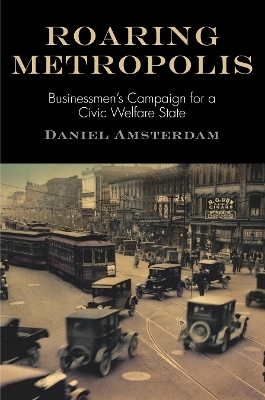
Roaring Metropolis
Businessmen's Campaign for a Civic Welfare State
Seiten
2016
University of Pennsylvania Press (Verlag)
978-0-8122-4810-4 (ISBN)
University of Pennsylvania Press (Verlag)
978-0-8122-4810-4 (ISBN)
Roaring Metropolis reconstructs the ideas and activism of urban capitalists in the early twentieth century as they advocated extensive government spending on an array of social programs. Focusing on Detroit, Philadelphia, and Atlanta, the book traces businessmen's quest to build cities and nurture an urban citizenry friendly to capitalism.
Debates about poverty and inequality in the United States frequently invoke the early twentieth century as a time when new social legislation helped moderate corporate power. But as historian Daniel Amsterdam shows, the relationship between business interests and the development of American government was hardly so simple.
Roaring Metropolis reconstructs the ideas and activism of urban capitalists roughly a century ago. Far from antigovernment stalwarts, business leaders in cities across the country often advocated extensive government spending on an array of social programs. They championed public schooling, public health, the construction of libraries, museums, parks, and playgrounds, and decentralized cities filled with freestanding homes—a set of initiatives that they believed would foster political stability and economic growth during an era of explosive, often chaotic, urban expansion.
The efforts of businessmen on this front had deep historical roots but bore the most fruit during the 1920s, an era often misconstrued as an antigovernment moment. As Daniel Amsterdam illustrates, public spending soared across urban America during the decade due in part to businessmen's political activism. With a focus on three different cities—Detroit, Philadelphia, and Atlanta—and a host of political groups—organized labor, machine politicians, African American and immigrant activists, middle-class women's groups, and the Ku Klux Klan—Roaring Metropolis traces businessmen's quest to build cities and nurture an urban citizenry friendly to capitalism and the will of urban capitalists.
Debates about poverty and inequality in the United States frequently invoke the early twentieth century as a time when new social legislation helped moderate corporate power. But as historian Daniel Amsterdam shows, the relationship between business interests and the development of American government was hardly so simple.
Roaring Metropolis reconstructs the ideas and activism of urban capitalists roughly a century ago. Far from antigovernment stalwarts, business leaders in cities across the country often advocated extensive government spending on an array of social programs. They championed public schooling, public health, the construction of libraries, museums, parks, and playgrounds, and decentralized cities filled with freestanding homes—a set of initiatives that they believed would foster political stability and economic growth during an era of explosive, often chaotic, urban expansion.
The efforts of businessmen on this front had deep historical roots but bore the most fruit during the 1920s, an era often misconstrued as an antigovernment moment. As Daniel Amsterdam illustrates, public spending soared across urban America during the decade due in part to businessmen's political activism. With a focus on three different cities—Detroit, Philadelphia, and Atlanta—and a host of political groups—organized labor, machine politicians, African American and immigrant activists, middle-class women's groups, and the Ku Klux Klan—Roaring Metropolis traces businessmen's quest to build cities and nurture an urban citizenry friendly to capitalism and the will of urban capitalists.
Daniel Amsterdam teaches history at the Georgia Institute of Technology.
Introduction
Chapter 1. At Cross Purposes: Businessmen's Political Activism Before the Armistice
Chapter 2. Detroit: Businessmen at Large
Chapter 3. Philadelphia: Money and the Machine
Chapter 4. Atlanta: City Building in Black and White
Chapter 5. Businessmen's Social Politics Beyond the Civic Welfare State
Epilogue. The 1930s and After
Notes
Index
Acknowledgments
| Erscheinungsdatum | 16.04.2016 |
|---|---|
| Reihe/Serie | American Business, Politics, and Society |
| Zusatzinfo | 2 illus. |
| Verlagsort | Pennsylvania |
| Sprache | englisch |
| Maße | 152 x 229 mm |
| Themenwelt | Geschichte ► Allgemeine Geschichte ► Neuzeit (bis 1918) |
| Geisteswissenschaften ► Geschichte ► Regional- / Ländergeschichte | |
| Sozialwissenschaften ► Soziologie | |
| Wirtschaft ► Betriebswirtschaft / Management | |
| Wirtschaft ► Volkswirtschaftslehre ► Wirtschaftspolitik | |
| ISBN-10 | 0-8122-4810-4 / 0812248104 |
| ISBN-13 | 978-0-8122-4810-4 / 9780812248104 |
| Zustand | Neuware |
| Haben Sie eine Frage zum Produkt? |
Mehr entdecken
aus dem Bereich
aus dem Bereich
Europa 1848/49 und der Kampf für eine neue Welt
Buch | Hardcover (2023)
DVA (Verlag)
CHF 67,20
Giordano Bruno - ein ketzerisches Leben
Buch | Hardcover (2024)
C.H.Beck (Verlag)
CHF 41,85


